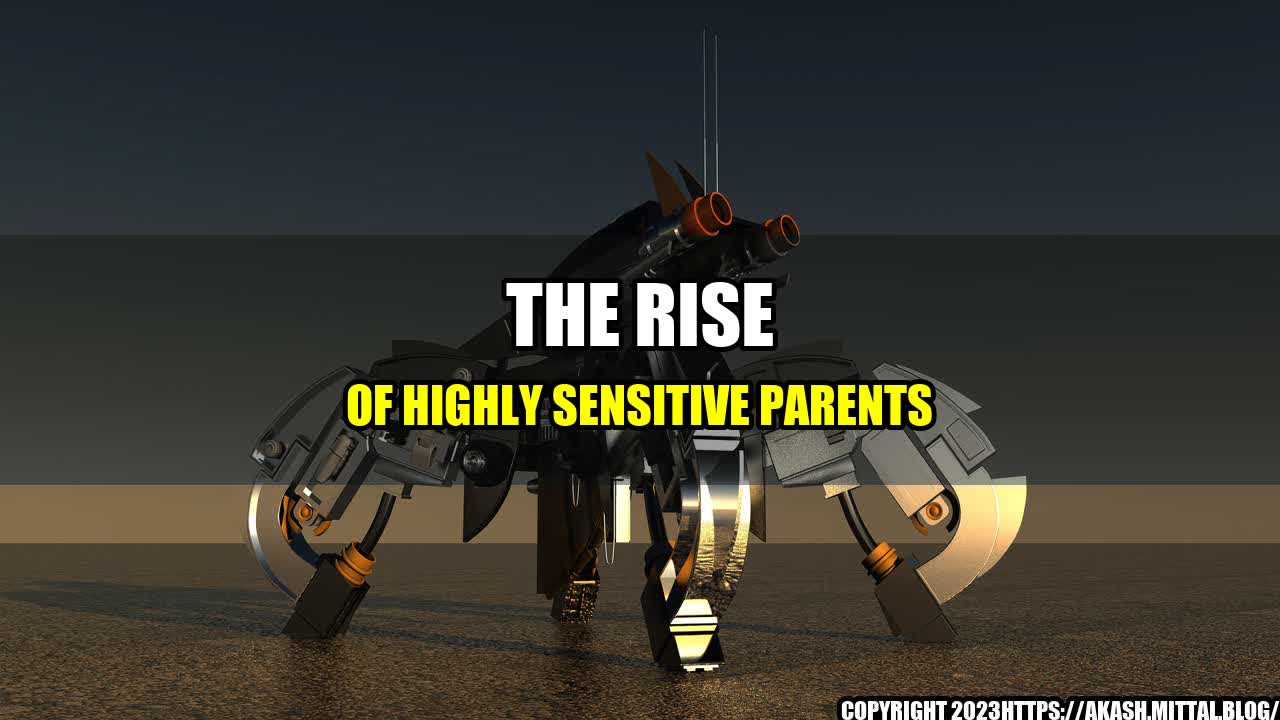Are You a Highly Sensitive Parent?
When Rebecca's daughter Lucy was born, she felt her whole world turned upside down. She loved her baby more than anything, but she also found herself feeling overwhelmed and anxious all the time. Any noise seemed too loud, any light too bright, any smell too intense. She couldn't stand watching the news or reading about tragedies. She cried more easily than before and felt drained by social interactions. It wasn't until she stumbled upon a book called "The Highly Sensitive Person" by Elaine Aron that she realized she might be what the author calls a "highly sensitive person" (HSP).
According to Aron, about one in five people have a nervous system that is more sensitive than average to stimuli and information. They're often deeply affected by art, nature, and emotions, and they tend to be intuitive, empathetic, thoughtful, and creative. However, they also tend to get overwhelmed by loud noises, crowds, deadlines, criticism, and conflict, and may need more time and space to recharge and process their feelings.
"I thought I was just being weak or crazy, but now I see that I have a trait that has its positives and negatives," says Rebecca, who now identifies as an HSP. "Knowing this has helped me understand myself and my daughter better, and has allowed me to reduce my own stress and take care of my needs without feeling guilty or ashamed."
Rebecca is not alone. In recent years, there has been growing awareness and acceptance of highly sensitive people and their unique needs and strengths. This has led to the emergence of a new breed of parents – highly sensitive parents (HSPs) – who are trying to navigate the ups and downs of parenthood with their heightened sensitivity in tow.
The Challenges and Rewards of Being a Highly Sensitive Parent
Being a parent is challenging enough, but being a sensitive parent can add extra layers of complexity and nuance. Here are some examples:
- Feeling overwhelmed by the intensity and frequency of a baby's cries, especially if they have colic or reflux.
- Struggling with the lack of control, predictability, and routine in early parenthood, which can make HSPs more anxious and stressed.
- Having a hard time balancing the needs of the child, the partner, the self, and the outside world, and feeling guilty or selfish no matter what.
- Being more affected by the emotional and physical demands of parenthood, such as sleep deprivation, isolation, and loss of identity, and needing more support and self-care.
- Becoming more aware of the potential risks and dangers of the world, and worrying more about the child's health, safety, and future.
- Having a strong intuition and empathy, which can help HSPs understand their child's needs and feelings better, but can also make them more vulnerable to the child's pain and suffering.
- Becoming more attuned to the subtleties and beauty of everyday moments with the child, and feeling more grateful, joyful, and inspired as a result.
Despite these challenges, many HSPs say that being a sensitive parent also has its rewards and joys.
- Feeling a deep sense of connection and love for the child, and being attuned to their unique personality, temperament, and quirks.
- Feeling a sense of purpose and meaning in raising a child who is kind, curious, creative, and compassionate.
- Feeling a sense of wonder and awe at the natural world, and sharing it with the child through hikes, gardens, animals, and art.
- Feeling a sense of growth and transformation in oneself, as the challenges of parenthood can help HSPs develop resilience, assertiveness, boundaries, and self-awareness.
Practical Tips for Highly Sensitive Parents
If you're a highly sensitive parent, here are some tips that may help:
- Understand and accept your sensitivity: Knowing that you have a sensitive nervous system can help you be more compassionate and forgiving towards yourself, and not judge yourself as weak or broken.
- Create a supportive environment: Try to reduce the noise, clutter, and chaos in your home, and surround yourself with calming colors, scents, and music. Also, seek out people who validate and appreciate your sensitivity, and avoid those who dismiss or criticize it.
- Take breaks and recharge: Make sure to have regular alone time, even if it's just for a few minutes, to decompress and replenish your energy. Also, prioritize sleep, exercise, and healthy eating, as these can boost your resilience and mood.
- Communicate clearly and assertively: Learn to express your needs and boundaries in a respectful and direct way, and don't feel guilty or ashamed for saying no or asking for help. Also, practice active listening and empathy towards your child, partner, and other people in your life, as this can enhance your relationships.
- Practice mindfulness and gratitude: Cultivate awareness and acceptance of your thoughts, feelings, and sensations, and try to stay present in the moment rather than dwelling on the past or worrying about the future. Also, notice and savor the small pleasures and beauty in your life, and express gratitude for them.

Curated by Team Akash.Mittal.Blog
Share on Twitter Share on LinkedIn